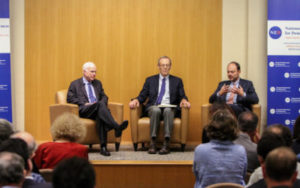Liberal democracies are facing an authoritarian resurgence and various forms of sharp power projections on the part of Russia and China. These countries are becoming more authoritarian and prohibiting independent thought and organization in civil society, says the Hoover Institution’s Larry Diamond.
There has never been a moment when civil courage, so brilliantly exemplified by Vladimir Kara-Murza, mattered more in our world than it does today, according to Carnegie Endowment President William J. Burns. This is a moment when authoritarians feel the wind in their sails, and democracies are adrift and losing their way. This is a moment when the practiced repressive habits of autocrats seem ascendant, and the institutions that guard freedom and dignity are being hollowed out in too many ways in too many societies, he told the Train Foundation as it awarded its Civil Courage Prize to Russian democracy advocate Kara-Murza.

Vladimir Kara Murza (far right) with NED’s Carl Gershman (center) and Senator John McCain
And this is a moment when civil courage can seem an endangered species, with civil society embattled in autocracies of one stripe or another, and individual citizens in democratic systems trapped by fatalism and tribalism, and battered by rising inequalities and the endless cacophony of identity politics. Around the world, walls are coming up faster than they are coming down. The politics of fear is drowning out the politics of hope, added Burns, a board member of the National Endowment for Democracy.
There remains a robust bipartisan commitment to advancing democracy in US foreign policy, according to two expert observers.
In the United States, the Congressional appropriations subcommittees that cover foreign operations, which handle the State Department and foreign aid budgets, are islands of bipartisanship, note Brian McKeon and Caroline Tess of the Penn Biden Center for Diplomacy and Global Engagement. They protect diplomatic resources and quietly advance worthwhile causes such as ending river blindness, promoting democracy, supporting girls’ education, and combating human trafficking. They also zealously guard their funding priorities, they write for Foreign Affairs.
“Many years of representing my country abroad have taught me that it is the power of our example, more than the power of our preaching, which can amplify all our other sources of military, economic, and political influence,” said Burns, who offering two lessons we should draw from this depressing landscape:
- The first is about American policy. The sooner we realize the foolishness of a strategy devoid of values, and reverse it, the better. We will not always get the balance right, and we will inevitably produce disappointments and make unappealing tradeoffs. …. At its best, American foreign policy has been animated by a sense of enlightened self-interest, in which we see a wider purpose to enlarging the circle of countries and societies which share our values and interests, and have a common stake in just, workable international rules of the road….
- The second lesson returns us to the profound importance of civil courage in any society, democratic or authoritarian or somewhere in between. Without brave individuals like Anna Politkovskaya or Jamal Khashoggi, without courageous exemplars like Vladimir Kara-Murza, societies wither and drift. Their fearlessness should give us the hope and courage to stand up for justice and address the flaws and challenges of our countries and our world.
“Authoritarians traffic in fear, and depriving them of that weapon is our surest path to a better future,” Burns added. RTWT







